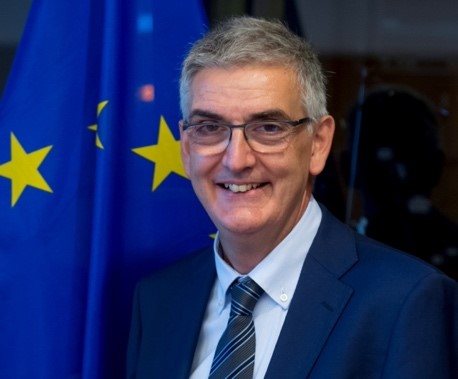
Prof. Silvio Brusaferro, Full Professor of Hygiene and Public Health at the University of Udine, Director of the unit Quality, clinical risk management and Accreditation at Udine Friuli Healthcare Trust.
SILVIO BRUSAFERRO is professor of Public Health at Udine University and Head of the Unit for accreditation, quality and risk management at the Regional -University Healthcare Trust “Friuli Centrale”. He graduated as Medical Doctor, post-graduated in Hygiene and preventive medicine, DTM&H Liverpool school of Tropical Medicine. During the most recent years he served as: President of the Italian National Institute of health, Speaker of the National Scientific Technical Committee (STC) with the role of advising and supporting the coordination activities to overcome the epidemiological emergency due to Coronavirus, Member of the EU Scientific Advice Platform on Covid-19, Member of the OECD Bureau of Expert Group on the economics of Public Health. His professional experiences, at national and international level, have been focused on Public Health. Research and educational issues of specific interest include: quality in healthcare, clinical risk and patient safety, infection prevention and control, antimicrobial resistance, best practices and core competences in public health, development of social networks to support health. He is author of over 200 papers indexed in PUBMED.
Title of the talk: Institutional Communication in Public Health Crises: Lessons Learned During the Sars-Cov-2 Pandemic
Abstract: Institutional communication although well recognized as essential tool during Public Health crises and in routine activities, gained new “momentum” and centrality during the recent SARS-CoV-2 pandemic. The pandemic experience made evident some macro issues: a) communication is, particularly the “institutional” one, a fundamental and essential pillar in setting up and managing the “response” to crises; b) Public Health has to invest in research in order to use communication appropriately and scientifically based; c) besides the traditional technical skills and competences , Public Health Workforce should be specifically trained on communication. Currently communication aspects are included in crises preparedness plans under development worldwide; nevertheless this is not enough: significant investments are required to strengthen Public Health organizations in their communication capability. How to deal with different and continuously evolving communication tools, with “infodemic” and “fake news”, with wide variations in health literacy; as well as how to guarantee a scientifically appropriate and not confusing information, how to coordinate messages at international level, are only some of the critical issues we have to face with. In this historical phase there are some great opportunities like the challenge to implement globally the WHO Competency and outcomes framework towards the delivery of the Essential Public Health Functions” which, once made public, will contribute to innovate and strengthen our Public Health and Healthcare systems. We all are called to support this evolution as active, competent and passionate actors.

Prof. Anna Middleton, Director of the Kavli Centre for Ethics, Science and the Public at the University of Cambridge
ANNA MIDDLETON is Director of the Kavli Centre for Ethics, Science and the Public at the University of Cambridge. She is a highly entrepreneurial researcher and communicator who leads a team of social science experts and engagement practitioners in Cambridge. She has a specialist interest in the social and ethical impact of genomics, continually asking – how is society responding to science? Utilising both quantitative and qualitative research methods to gather empirical data on attitudes, beliefs and values about ethical issues raised by genomics, Professor Middleton produces outcomes that have a practical value in helping guide the public’s understanding of the science. She leads the internationally recognised ‘Your DNA Your Say’ project which has gathered the views of 37,000 individuals in representative public audiences, from 22 countries, with data gathered in 15 languages, offering a public view on trust and familiarity with genomic data sharing. For this work she leads a team of researchers in Cambridge and also manages a team of 22 global collaborators. Professor Middleton is passionate about connecting scientific and public audiences around cutting-edge scientific developments and their ethical implications and has produced numerous films on science that have received recognition at international film festivals around the world.
Title of the talk: Human Embryo Editing: Citizens Jury for deliberation of ethics and policy formation
Abstract: For a week in September 2022, 21 people with personal experience of genetic disease travelled from across the UK to the Wellcome Genome Campus near Cambridge to sit as members of the UK Citizens Jury on Genome Editing. The jury members were selected to broadly reflect the demographic make-up of patients who are eligible to use genomic medicine services and genetic counselling in the NHS. The aim was to provide an insight into the perspectives of a group of patients with inherited genetic conditions on what they think about the benefits, risks and wider harms emerging from the application of embryo genome editing. The citizens jury deliberated over 4 days on the following question: Are there any circumstances under which a UK Government should consider changing the law to allow intentional genome editing of human embryos for serious genetic conditions?
This presentation will involve showing the 10 minute filmed documentary of the citizens’ jury process, a film that has picked up 7 film festival awards and prompt us to think about how publics are brought into discussion about controversial ethical issues and supported to write their own policy recommendations. This work has been awarded the Vice Chancellor’s award for public engagement and impact at the University of Cambridge in the category of best ‘collaborative’ project 2023.
https://www.kcesp.ac.uk/projects/citizens-jury-on-human-gene-editing/

Professor Stefan Timmermans, Professor of Sociology, University of California, Los Angeles
STEFAN TIMMERMANS is professor of sociology at UCLA. His research interests include medical sociology and science studies. He has conducted research on medical technologies, health professions, patient-doctor interaction, death and dying, and population health. He is the author, most recently, of Postmortem: How Medical Examiners Explain Suspicious Deaths (Chicago, 2006), Saving Babies? The Consequences of Newborn Genetic Screening (Chicago 2013, with Mara Buchbinder), Abductive Analysis: Theorizing Qualitative Research (Chicago 2014, with Iddo Tavory), and Data Analysis in Qualitative Research: Theorizing with Abductive Analysis (Chicago 2022, with Iddo Tavory). He is also senior editor medical sociology for the journal Social Science and Medicine, editor-in-chief for Social Science and Medicine: Qualitative Research in Health, and book series editor for the University of Chicago series on Ethnographic Encounters and Discoveries.
Title of the talk: Contextualizing the Patient-Doctor Encounter
Abstract: The argument in the talk is that the interactional exchanges we observe in patient-clinician interactions are largely curtailed by ongoing shifts in social roles, external institutional pressures, and national health policies. Exploring these aspects enriches our understanding of what we observe. The talk will contextualize key aspects of the US patient-clinician encounter in four ways: the changing role of the patient to be more engaged in their own care, the changing role of the health care provider as a frontline gatekeeper in health care businesses subject to financial and time pressures and incentives, the varying and changing ontology of disease categories through medical technologies, and the policies making some treatments available while rendering others inaccessible. It also urges researchers to ask what needs to be in place for the social interaction to be possible.
Featured speaker

Prof. Francesco Castelli, Rector of the University of Brescia, Italy
FRANCESCO CASTELLI graduated in Medicine and Surgery with honours in 1983. He then specialised in Infectious Diseases (University of Pavia, 1987) and in Tropical Diseases (University of Milan, 1991). Since 2005 he is Full Professor of Infectious Diseases, and since November 2022 also Rector, of the University of Brescia. He has also held the positions of UNESCO Chair in “Training and empowering human resources for health development in resource-limited countries” and Director of the Division of Infectious and Tropical Diseases of the Civil Hospital of Brescia since 2014. He has published more than 500 articles in international, peer-reviews journals and more than 110 treatise and manual chapters. He has an H-index of 63 (Scopus) e 73 (Google Scholar). In 2013 he was included in the list of “Top Italian Scientists”, and in 2021 he received the rank of Officer from the Order of Merit of the Italian Republic. He is currently member of the Class of Sciences at the Atheneum of Brescia.
Title of the talk: Health literacy and communication with migrants’ populations. The case of Covid-19
Abstract: Unsafe migration entails significant health risks for migrants, including exposure to harsh conditions, violence, and lack of access to basic healthcare. Health disparities among migrants, stemming from dynamics of social inequality and marginalization in destination and transit countries, not only impact individual well-being but also hinder progress towards global public health goals. Limited accessibility to essential healthcare services not only compromises the autonomy and empowerment of migrant individuals but also contributes to increased stigmatization and social exclusion. Addressing these challenges requires a thorough review of healthcare policies, with an active focus on the specific needs of migrant populations to pursue the right to health, as enshrined in Article 32 of the Italian Constitution. In this perspective, promoting health and access to healthcare services, and overcoming linguistic and cultural barriers, emerge as fundamental pillars. The experience of the COVID-19 pandemic has demonstrated how individuals belonging to linguistic minorities have had less access to healthcare information and preventive measures, and consequently been more exposed to health misinformation. The pandemic has further underscored the need to invest in more inclusive and culturally sensitive approaches to health communication, recognizing that effective communication is crucial to ensuring that information reaches all individuals, regardless of their background or spoken language. In this context, i) promoting person-centered healthcare services, ii) investing in training and enhancing the cultural competence of healthcare providers, and iii) promoting community-based participatory healthcare models, become key elements in providing a healthcare system that fully respects the health rights of migrant individuals, thereby contributing to a more equitable and inclusive global landscape.

